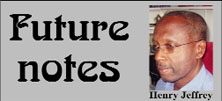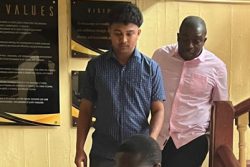Last week, in response to the Alliance for Change (AFC) letter stating its intent to move a motion of no-confidence in his government under article 106 of the Constitution, President Donald Ramotar stated that he and his party were ready for any eventual elections, and then he did a very strange thing, which suggests the opposite. He warned the AFC that if they should succeed with the motion and an election is called, they will have to answer to the electorate for their actions on at least half a dozen issues.
Of course, whether elections are held in three months or two years when they are constitutionally due, the PPP will see to it that the AFC is confronted by the identified questions, and since there is no good reason why allowing the regime more time in office should make those questions any easier to answer, our president was showing his slip.
His warning appears more an attempt to frighten the AFC away from the no-confidence course at a time when the PPP is so much in the political doldrums that it is even afraid to call local government elections.
 Another reason why the president should not have framed his response in the manner he did is because it brings to mind the questions he and his party would need to answer if elections were called today. It immediately brought to my mind some 30 questions to which they cannot provide sensible answers; even to their own supporters. Here I will deal with only two.
Another reason why the president should not have framed his response in the manner he did is because it brings to mind the questions he and his party would need to answer if elections were called today. It immediately brought to my mind some 30 questions to which they cannot provide sensible answers; even to their own supporters. Here I will deal with only two.
Firstly, how is it that having been given less than a majority at the last elections, the PPP has failed to take the usual course of political parties finding themselves in such situations?
In such cases, they form a coalition with some other party, try to agree upon cooperation, issue for issue, agreements with one or all of the other parliamentary parties or immediately return to the country to reaffirm their mandate. Instead of any of these tried and tested methods, the PPP sought to bully the opposition with a barrage of propaganda.
Outside of its bottom house meetings, this is a question that the PPP cannot sensibly publicly answer. Its job was to utilize the limited mandate to move the country forward but instead it adopted an approach that was certain to lead to political antagonisms and gridlock and sooner or later force another election on the nation.
Generally, at the bottom houses, it has attempted to convince its supporters that to form a coalition with the PNC, given the support that party still has in the security services and the public service, would in effect hand over power to it to the detriment of the long term interest of Indians.
If asked why it did not try to make an arrangement with the AFC, it would attempt to make that party indistinguishable from the PNC. After all, it would say Raphael Trotman and Nigel Hughes are PNC sleepers in the AFC. Indeed, to demonstrate this, in the tally of frighteners that the AFC will have to answer, the president has already indicated that it will have to say why its chairman “interfered with the judicial process causing the persons who were charged with the Lusignan massacre to walk free.” As for Moses V. Nagamootoo and Khemraj Ramjattan, they are simply traitors to the cause.
Of course, the truth appears to be more basic and personal. In almost every area of governance there have been persistent allegations of governmental excess, wrong-doing, corruption and even criminality. Any coalition or cooperation arrangement with the other political parties will require a massive sharing of information to which, as we have seen, the PPP is averse.
It seems to me that APNU MP Joseph Harmon came close to the real reason why the PPP is reluctant to cooperate with the other political parties. When, in commenting on the US State Department Report on Human Rights that focused on the level of corruption and transparency in Guyana and why it is that the law is not adequately implemented here, he stated “They don’t want to effectively implement laws in Guyana, because the implementation will mean that a lot of the corruption will come to an end and a lot of people, a lot of big officials will go to jail,” (“Govt. afraid to implement corruption laws” KN: 07/03/2014)
My second question is: how is it that after all the propaganda about the substantial economic growth that has recently been taking place – half-truths that have been largely bought uncritically even by the media and some commentators – the latest World Bank (World Development Indicators) figures of Guyana real growth compared to its Lower Middle Income (LMIC) category, is as follows:
GDP per capita PPP (constant 2011 international $*)
Countries 2000 2010 2012 % average annual growth
LMIC 3,372.7 5,252 5,619.5 5.6
Guyana 5,071.4 5,542.1 6,053.7 1.6
*An international dollar has the same purchasing power over GDP as the U.S. dollar has in the United States.
The truth is that statistical and infrastructural manipulations to give the impression of great economic progress always come to naught. It does not matter where you live in Guyana; you need only look out of your windows to realize that the protestations of even adequate development are a myth. Almost all the maladies of our society are the result of our not – for political reasons – making the most of our human and natural resources. The political system is broken and needs radical surgery: no amount of propaganda can possibly hide that fact.
Countries have come through worse than we have, but once the political elites have come to realize that constant warring and intransigence do not serve the national interest, they have been able to make sensible accommodations. Look at Northern Ireland, a country not unlike ours and where the situation is still not totally settled.
But Martin McGuiness a former leader of the notorious Provisional Irish Republican Army (IRA) is at present working alongside his former Unionist opponents. They could not naïvely wait for trust to be built because trust is not built in isolation: it is built in praxis. They had to create a political framework that allowed them to work, quarrel and together solve their evolving differences.
henryjeffrey@yahoo.com








